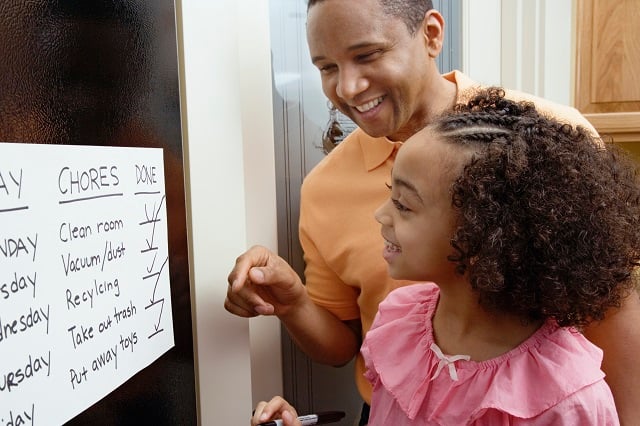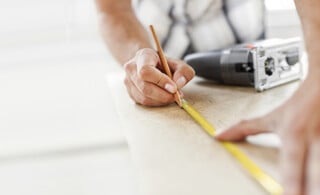 Life is becoming faster-paced and more automated every day, and we have begun to hire people to do a lot of the work we used to do ourselves. For many families, chores — once a tradition and a way of life — have become an optional way to earn spending money or a novel and occasional attempt to teach responsibility.
Life is becoming faster-paced and more automated every day, and we have begun to hire people to do a lot of the work we used to do ourselves. For many families, chores — once a tradition and a way of life — have become an optional way to earn spending money or a novel and occasional attempt to teach responsibility.
However, chores are still a great way to teach kids valuable life lessons and help parents keep a healthy, happy home. Many parents simply struggle to find age-appropriate tasks for their children that are truly valuable, and many children lack motivation to pitch in without a tangible reward.
Luckily, we can help with all of that. Just keep reading.
The Value of Hard Work
According to the experts, chores help children feel needed. Even simple responsibilities ensure children that they are a valuable, contributing member of the family. Of course, that’s not the only way children benefit from chores. Requiring children to help with chores when they are young can improve their lives as they grow into adults.
Chores Can:
- Help children become more successful adults
- Prevent drug use
- Improve relationships
- Instill self-confidence
- Kick start gross & fine motor skills
- Promote the concept of teamwork
- Self-discipline
Rewarding your child for their hard work via a regularly-scheduled allowance or an occasional treat for doing a good job shows them that good things come to those who wait… and work hard. After all, chores aren’t exactly fun, and children don’t usually want to do them. By requiring them to do these things — especially when they don’t want to — they develop skills that will help them in all aspects of their lives, from school and work to community and relationships.
Chores by Age
One of the keys to successfully incorporating chores into your family routine is choosing appropriate tasks for your children’s ages and development, without over- or underestimating their abilities. As with any other aspect of parenting, it can be tricky to get exactly right. Here’s a list that can help. Keep in mind that any chores suitable for a younger child are also good for older children.
Ages 2 to 3
- Putting away toys
- Feeding pets
- Putting dirty clothes in the laundry basket
- Wiping down surfaces
- Dusting
- Stacking books
- Folding washcloths
- Fetching items, like diapers and wipes
Ages 4 to 5
- Making the bed
- Emptying trash bins
- Checking the mail
- Clearing the table
- Pulling weeds in the garden
- Watering plants
- Unloading plastic dishes and utensils from the dishwasher
- Using a handheld vacuum to clean small messes
Ages 6 to 7
- Sorting dirty laundry
- Folding towels and matching socks
- Replacing toilet paper roll
- Sweeping
- Setting the table
- Packing lunch
- Raking leaves
- Keeping their bedroom clean
Ages 8 to 9
- Loading the dishwasher
- Unloading and putting away groceries
- Vacuuming
- Helping cook meals
- Serving their own snacks
- Putting away laundry
- Sewing buttons
- Mopping
- Walking the dog
Ages 10 and up
- Unloading the dishwasher
- Folding laundry
- Cleaning the bathroom
- Washing windows
- Washing the car
- Cooking simple meals
- Ironing clothes
- Doing the laundry
- Keeping an eye on siblings (with an adult present)
- Changing bed sheets
Of course, these are just suggestions. It’s OK to let your child try new tasks early, if you feel they are ready. It’s also fine to take it more slowly, if you feel they aren’t. If you start at an early age and continue to increase responsibility, by the time your children are teenagers, they will be ready and able to do basically any household chore.
Getting Motivated
Getting your child to help out around the house can be a chore in and of itself. The good news is that there are plenty of ways to motivate your kids to do the work, and they may even enjoy it.
Expectations
First, remember that done is better than perfect. You can’t expect your child to complete their chores the same way you would. They may even make more of a mess sometimes. However, you can’t micromanage them or take over without compromising the confidence you’re trying to build. So, sit back, let your children do what you’ve asked, and be proud of the result. Praise them and encourage them from start to finish. Receiving that type of appreciation and love will have them chomping at the bit to do the next task.
Starting early in life and being consistent will help get children in the habit of doing their part. No matter their age, gimmicks like chore charts can be a visual reminder for you and for your child of what they’ve accomplished and what is left to be done.
Praise & Rewards
When it comes to rewards, many parenting experts advise against tying allowance to helping out around the house. By incentivizing chores your children are supposed to do anyway, you change the point. It’s no longer about personal responsibility to the family. Moreover, kids who aren’t motivated by money — which can be all kids, depending on the day — may think they can choose not to do the tasks at all if they don’t mind not getting paid. However, it is important to ensure your children know how much their contribution is valued, and providing an occasional reward is a great way to do that. You can also offer your children money to go above and beyond their normal tasks and take on extra responsibility.
Have Fun
Finally, find a way to make it fun and educational. Turning mundane tasks into a friendly competition between siblings is a great way to motivate multiple kids at once. Asking your toddler to count out four potatoes for dinner helps them learn. Turning on some music and dancing through tasks as a family turns chores into a chance to bond. Your kids may just start enjoying the work you’ve asked them to do.
Of course, every family is different, and there is no one-size-fits-all approach to getting your kids to contribute. However, by choosing age-appropriate chores, not requiring perfection, starting early, and being consistent, your children could be well on their way to the many benefits that childhood chores offer. Bonus points for making it fun!
 Fix-It 101: The Fix-It Literacy Guide
Fix-It 101: The Fix-It Literacy Guide  Engineering the Future: The Educator’s Guide to Building and Construction
Engineering the Future: The Educator’s Guide to Building and Construction  Preventing Home Improvement Fraud
Preventing Home Improvement Fraud  Working Well with Contractors: 15 Questions that Prevent Fraud and Ensure Satisfaction
Working Well with Contractors: 15 Questions that Prevent Fraud and Ensure Satisfaction  Report from PCBC: New Home Construction
Report from PCBC: New Home Construction 

Are You Familiar With This Topic? Share Your Experience.